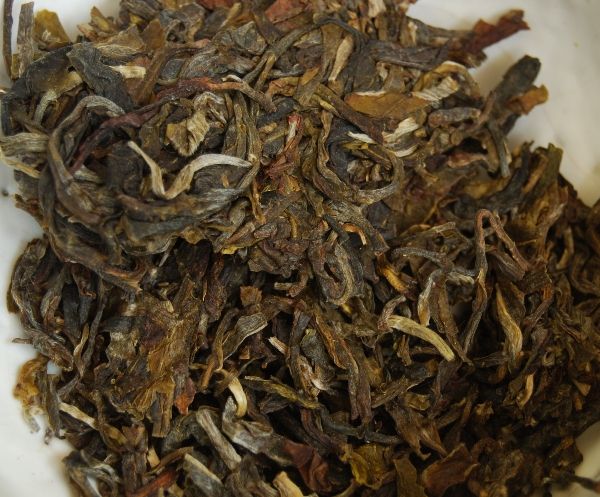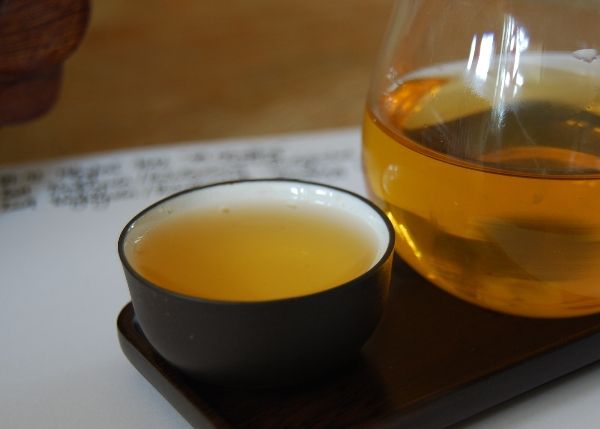Here, "chunqing" [Choon-ching] means "true feeling". My wife recoils in toe-curling horror at the name, saying that it sounds like something appallingly wet that a teenage girl would say. I'm still chuckling.
At $50, it's not inexpensive. The price of Banzhang maocha is always high (well, the highest, in fact) - but is this good Banzhang? Scott writes that it was selected after testing 15 different maocha, which sounds like a fun time in anyone's estimation.
Long leaves, large fragments, lots of tips, stone compression - pictured below. The aroma is a touch hesitant, but then I did try this one immediately after the uber-aromatics of the Guafengzhai.
As with all of these teas, excepting the orange Bulangshanyun, the soup is an encouraging yellow. This one has a hint of green about it, as did the Guafengzhai. It is clean and vegetal in flavour, and with a decent aftertaste that swells to make my mouth water.
The yunxiang [after-aroma] is a gentle sweet butter. In texture, I quite like its decent thickness and its overall sweetness. It is clean and decent - while not as complex as some of the qiaomu Laobanzhang maocha that I was fortunate enough to receive from Nada a while ago, it is nonetheless very enjoyable. I couldn't place this as a Banzhang leaf explicitly, but then again, it doesn't taste explicitly unlike Banzhang either.
It has no great vibrancy on the tongue, nor the cooling sensation that I've had from Nada's Lao- and Xinbanzhang samples, and these latter are a constant source of comparison for me in trying Banzhang teas. It's a good thing to have reliable benchmarks.
Overall, it is soothing and gradual, rather than being instantly energising.
Sweet, thick, with that buttery yunxiang, it is enjoyable. Is it $50 enjoyable? Perhaps not, but, then again, it is far better than most of the modern cakes that we see for sale from Western-oriented vendors. I think that the price reflects the expense associated with Banzhang leaves, rather than the quality of the tea itself, but it is very decent. It is, in my opinion, not able to sit next to the Guafengzhai at $50, for example.
With that, let us bid the Yunnan Sourcing tasting event adieu. I very much hope that you've enjoyed being along for the ride, and, if you were quick enough off the mark in getting into the event, I hope that you've enjoyed drinking these teas along with Lei and me. Thanks again to all those who have posted their notes while we've been going along.





Sample Epsilon showed a very balanced taste of bitterness, sweetness and sourness in the first few infusions with the bitterness dominating in the following ones. I was surprised this tea gave a very intense flavor on from the first infusion. Creamy smokiness, fruit and vegetal aroma danced together on my tongue in a long lasting aftertaste. The smokiness faded after the 5th infusion leaving the fruit and vegetal taste intense until I stopped the session. The sweetness peaked in the 6th & 7th infusion. Since then the tea didn't develop greatly anymore. I stopped after the 15th infusion, knowing this tea could have gone on and on.
ReplyDeleteFazit: I really liked this tea. It has some of the intensity I missed in the other samples.
My ranking:
1. Epsilon
2. Alpha
3. Beta, Gamma, Delta
Thank you Scott and Hobbes for providing the tea samples and the discussion for this tea tasting event!
For me Epsilon was the star of the show. The dry leaf is pungent with beany, leather and tobacco notes, lots of depth. The tea opens up quickly, the first infusion is saturated with flavor. Backbone of earthy malted grains with a touch of the leather and tobacco. Long beans and chestnuts are the main flavors I detect. Very full and saturated flavors. Sweetness and bitterness are in sinc with each other making for a very balanced tea. Durability is exellent, easily tea pots. The bitterness does become a little more assertive in the later brews but not over the top. I liked this tea enough to buy a couple of these cakes, but I didnt pay $50.00 each, the price is $40.00, which at that price it,s not only an exellent tea but a good value as well. Again, Thanks to Scott and Hobbes for this tasting.
ReplyDeleteFirstly, Thanks for the samples - I had a good time reviewing them. I have been 'just drinking' the tea lately, and going back to writing about it was fun.
ReplyDeleteAs Brent has ranked them, I'll do likewise:
1)Delta
2)Alpha
3)Epsilon
4)Beta
5)Gamma
With the caveat that Delta is the only one I found myself tempted to buy. I am amazed that it is the least expensive.
Epsilon:
Nice robust, sweet tobacco and leather aroma from the dry leaf,
which consists of long, healthy-looking leaves which endured
moderate compression. Silvery fuzz on most of the leaves; I
predict a silky 1^st infusion. The beidixiang begins with an
almost unscented steam, which blossoms into a burst of sweetness
then diminishes quickly. The silk I was expecting is here, but
it’s nothing out of the ordinary. There is a nice round tobacco
and leather taste to this one, but it lacks ku and produces no
huigan.
This tea delivered bursts of sweetness, nice full chalky mouthfeel, and smooth energizing qi.
ReplyDeleteHere is the link to notes on MattCha's Blog:
http://mattchasblog.blogspot.com/2009/09/yunnan-sourcing-mystery-sample-epsilon.html
Peace
Thanks for taking the time to post your notes, one and all.
ReplyDeleteToodlepip,
Hobbes
Hobbes, here are my tasting notes for the Epsilon sample:
ReplyDeletehttp://39steeps.blogspot.com/2009/10/review-series-pu-erh-5-epsilon-by.html
What a great time. Thank you for allowing me to be a part of this tasting event. It's been an enjoyable learning experience for me.
Thanks, Steven - I'm glad that you enjoyed it!
ReplyDeleteToodlepip,
Hobbes